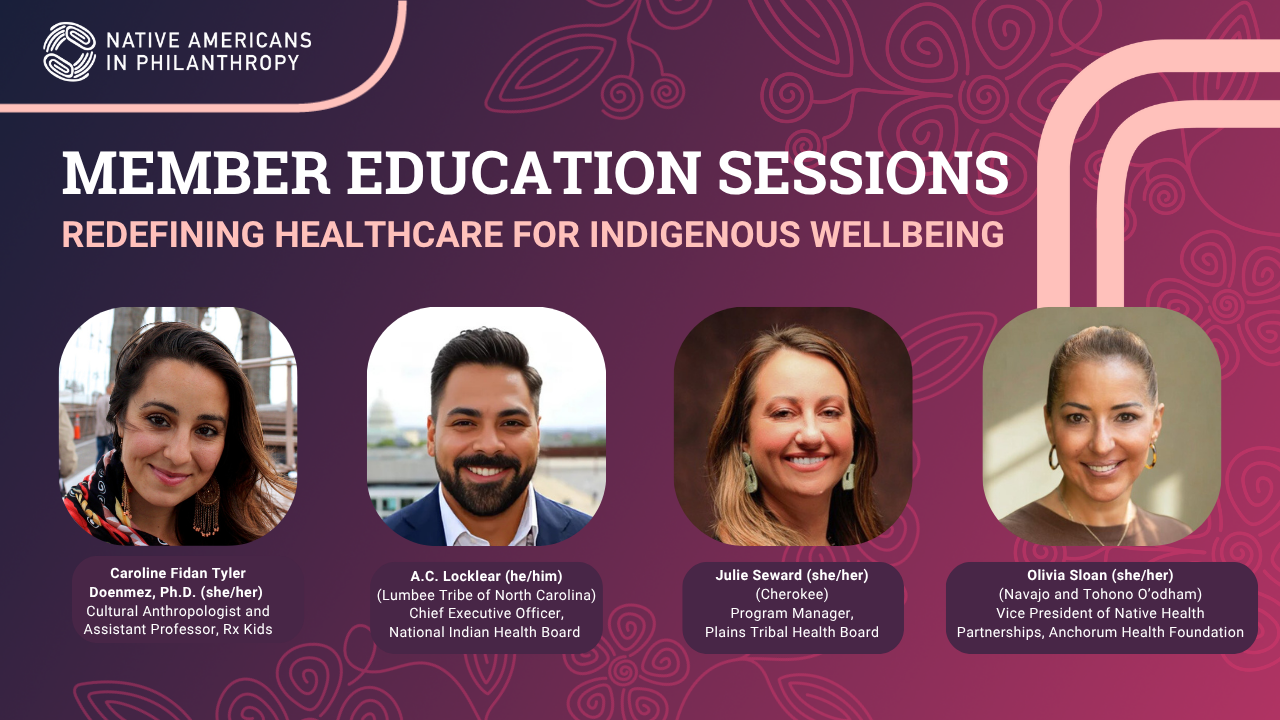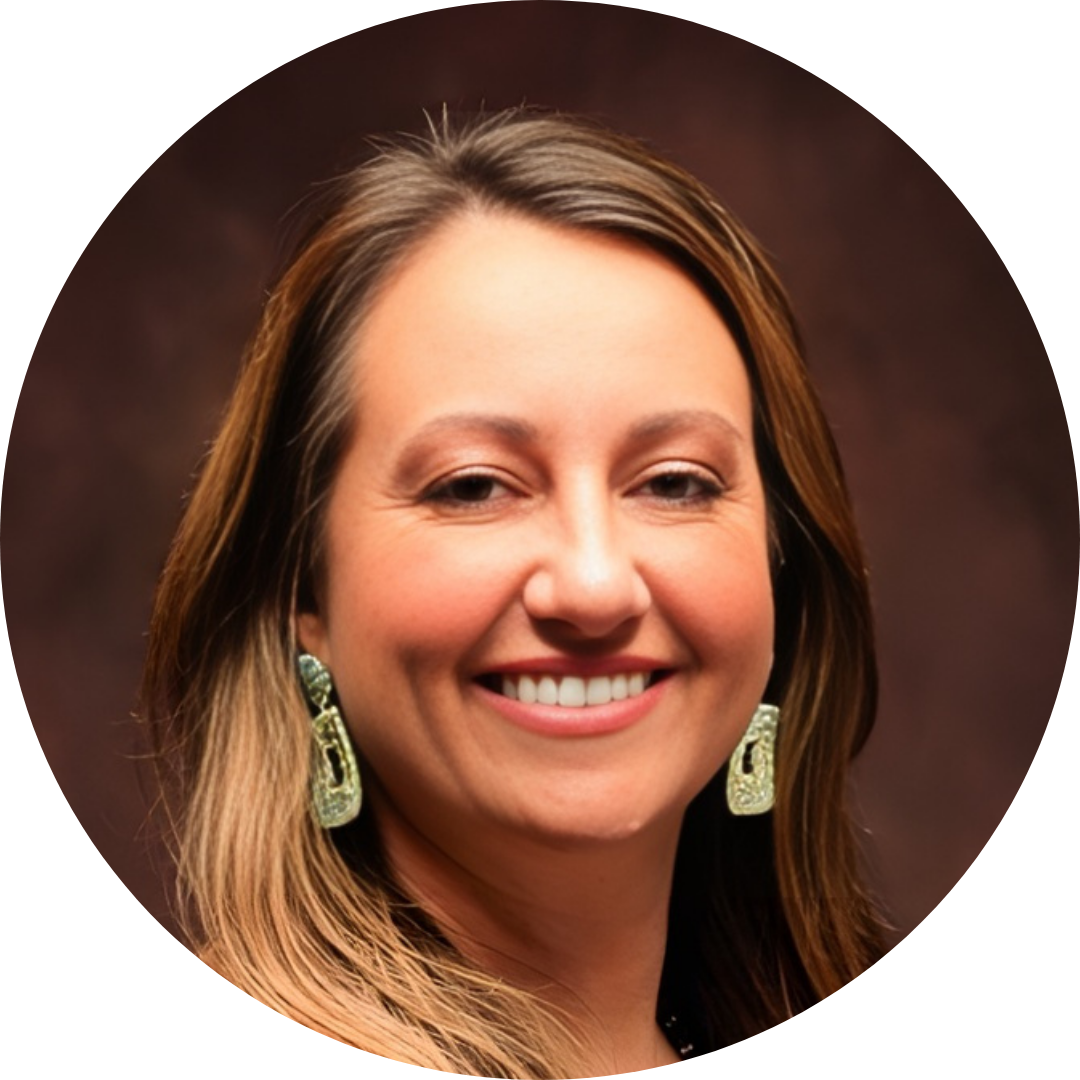
This Membership Education Session was a powerful, solutions-focused program exploring Indigenous healthcare and how organizations nationwide are addressing critical healthcare gaps while uplifting culturally informed services that better serve Native communities.
With cuts to the historically underfunded Indian Health Service, systemic change is essential to ensure the collective strength and survival of our peoples. The burden of chronic inequities spans generations—and so too must our solutions. This panel brought together community leaders, researchers, and advocates to explore how improving representation in medicine, reinforcing traditional and cultural healing practices, and building sustainable philanthropic partnerships will secure a stronger future for the next seven generations.
Join Rx Kids' representative, Caroline Fidan Tyler Doenmez, Ph.D.; the National Indian Health Board’s CEO, A.C. Locklear (Lumbee Tribe of North Carolina); Southern Plains Tribal Health Board’s Program Manager, Julie Seward (Cherokee); and Anchorum Health Foundation's Vice President of Native Health Partnerships, Olivia Sloan (Navajo and Tohono O’odham) in moving beyond administrations and focusing on long-term transformation.
Watch the broadcast now on NAP’s YouTube Channel and be sure to subscribe to the NAP YouTube channel for more informative and important resources on Native communities.
Native Americans in Philanthropy welcomes you to engage in a gathering of nonprofits, philanthropy, emerging leaders, and Indigenous communities for discussions and collaborative action for building philanthropy rooted in Native traditions and values.
Our curated education sessions of virtual conversations, panels, and speakers represent the diversity of Indian Country, the experiences of Indigenous Peoples in America, and the allies that are working to support these communities. These sessions are designed for NAP members working in philanthropy and will focus on how philanthropy can operate differently to center Indigenous perspectives and values.
Through these sessions, NAP is passing the mic to individuals, Tribes, and Indigenous nonprofits who are experts in their respective fields. This intentional platform will foster an informed membership that will lead the shifting of the philanthropic sector in deeper, more impactful ways that serve the people, communities, and causes they care about.

Cultural Anthropologist and Assistant Professor, Rx Kids
View BioCaroline Fidan Tyler Doenmez is a cultural anthropologist and assistant professor in the Department of Anthropology at Michigan State University, where she is affiliated with the American Indian and Indigenous Studies program and the Center for Gender in Global Context. She is currently leading qualitative research for Rx Kids in Flint, Michigan.
Her book project, Carrying Water: Indigenous Women Reclaiming Birthing Sovereignty along the Red River draws on ethnographic research and interviews conducted with Indigenous doulas and midwives in Manitoba and British Columbia between 2017-2022. Caroline has received awards and fellowships from the American Association of University Women, the Fulbright Program, the Race, Indigeneity, Gender and Sexuality Studies Initiative at the University of Minnesota, and the Doctoral Dissertation Fellowship at the University of Minnesota, among several other sources. Her writing has been published in the Native American and Indigenous Studies Association Journal, Open Rivers Journal, BMC Pregnancy and Childbirth, Midwifery, Women’s Health, International Journal for Equity in Health, Frontiers in Women’s Health, South Dakota History, and the anthology Forever Loved: Exposing the Hidden Crisis of Missing and Murdered Indigenous Women and Girls in Canada.
She earned a BA from Smith College, an MA from Columbia University, and a PhD from the University of Minnesota. Caroline is of Kurdish and English settler descent and was raised in the Monadnock region of New Hampshire. She currently resides in East Lansing, MI with her husband Elan and two young children.

Chief Executive Officer, National Indian Health Board
View BioA.C. Locklear, a citizen of the Lumbee Tribe of North Carolina, serves as the Chief Executive Officer for the National Indian Health Board (NIHB). Founded in 1972, NIHB advocates as the unified voice for all American Indian and Alaska Native Tribes to reinforce Tribal sovereignty, strengthen Tribal health systems, secure resources, and build capacity to achieve the highest level of health and well-being for American Indian and Alaska Native People. As the CEO, A.C. is committed to leading with integrity, fostering sustainability across NIHB and Public health in Indian Country, and enhancing cooperation among the Tribes and Native organizations to create lasting, positive impacts for our people.
Prior to his role as CEO, A.C. previously served as the Federal Relations Director at NIHB, leading NIHB’s federal budget and regulatory policy priorities, including developing and advancing Tribal health and public health policy priorities to the White House and federal government agencies, lead budget formation, analysis, and advocacy work, and bolstered Tribal leader participation in consultation and Tribal advisory committees. He also facilitated collaboration between the federal government and Tribes to increase access to quality health programs and advance federal policies to improve the health and well-being of American Indians and Alaska Natives. Prior to NIHB, A.C. also served as a Program Manager for the Center for Native American Youth at the Aspen Institute and the Director of Student Engagement for the University Office for Diversity and Inclusion at the University of North Carolina at Chapel Hill.
A.C. is a two-time graduate of the University of North Carolina at Chapel Hill. He earned his Bachelor of Arts degree in American Studies, with a concentration in American Indian and Indigenous Studies, in 2013, and his Juris Doctorate in 2016. The driving force behind A.C.’s educational and professional experiences is the desire to continue the path of his ancestors and those who came before him by working to counteract barriers and improve Tribal communities and the quality of life for American Indian and Alaska Native peoples. A.C. is originally from Pembroke, North Carolina, and is a citizen of the Lumbee Tribe of North Carolina.

Program Manager, Southern Plains Tribal Health Board
View BioJulie Seward (Cherokee) is a Program Manager at the Southern Plains Tribal Health Board
(SPTHB), a nonprofit organization based in Oklahoma City that provides a unified voice on tribal
public health needs and policy for the 44 federally recognized Tribes across Kansas, Oklahoma,
and Texas. Julie brings over 20 years of experience in oral health and a decade of clinical
experience as a dental hygienist in general and periodontal practice settings, as well as three
years of service as dental hygiene faculty.
At SPTHB, Julie leads multiple initiatives advancing Indigenous-led workforce development,
including the Community Health Aide Program (CHAP) and the Native Oral Health Network
(NOHN). Her work focuses on strengthening community-based, culturally grounded health
career pathways that expand access to care and promote health equity across Tribal Nations.
Julie has held several leadership roles in oral health advocacy, including serving as Oklahoma’s
Grassroots Representative and as a member of the National Oral Health Connection Team
(NOHCT) through the Oral Health Progress and Equity Network (OPEN). She has also served
as vice-chair of the Oklahoma Oral Health Coalition, Public Health Chair of the Oklahoma
Dental Hygienists’ Association, and currently serves on the Dental Hygiene Advisory Committee
to the Oklahoma State Board of Dentistry.
Her dedication to advancing Tribal public health and equitable workforce models has been
recognized with numerous awards, including the Oklahoma Public Health Association’s
Exceptional Merit Award (2020), Delta Dental of Oklahoma Foundation’s Distinguished
Service Award (2023), and DentaQuest Health Access Hero Award (2024).

Vice President of Native Health Partnerships, Anchorum Health Foundation
View BioBorn and raised in Santa Fe, Olivia is a healthcare leader passionate about health equity and policy advocacy for Indigenous communities. As a Native (Dine and Tohono O’odham), she is deeply committed to serving Native communities. Her expertise in policy, clinical research, advocacy, and cultural understanding, makes her an invaluable asset, especially as Anchorum Health Foundation expands their service area to include all of New Mexico’s Pueblos and Tribal Nations.
Her father’s passing inspired her journey to becoming both a nurse and cancer researcher, leading to managerial roles at CHRISTUS St. Vincent Regional Cancer Center. There, she oversaw clinical trials and authored and secured a grant to implement a new Native Health Navigator program to support Native Americans with cancer diagnoses in navigating a non-Tribal healthcare system.
Throughout her career, she has collaborated with diverse organizations to address healthcare gaps, promote culturally sensitive care, and expand research initiatives, leading to improved healthcare access and outcomes for underserved populations.

Program Manager of Tribal Buffalo Lifeways Collaborative
View BioAnpo was born and raised on the Pine Ridge Reservation in South Dakota, and earned her B.S in Environmental Systems Engineering and her M.S. in Civil and Environmental Engineering from Stanford University, where she was the first Native woman on Stanford’s Student Global Health Board. As a writer, author, and poet, she interweaves her experiences as an Oglala woman, engineer, tribal college adjunct instructor and advocate for Indigenous solutions in global health & climate change in her creations.
Some of her advocacy roles have included being an Environmental Health Specialist for the International Indian Treaty Council, a youth representative of the Black Hills Sioux Nation Council, and North American Focal Point of the UN Global Indigenous Youth Caucus. In these capacities, she has delivered testimony on the United Nations floor that led to formal policy recommendations on Indigenous languages & health from the UN Permanent Forum on Indigenous Issues to the World Health Organization (WHO). Additionally, she was nominated and selected to serve on the first Youth cohort at the International Conference on Chemicals and Waste Management in Bonn, Germany.
Her work has been featured in & by Forbes Magazine, the Native American 40 under 40 list, Scope, Grist, the UN Youth Envoy, the Oxford Climate Review, The Lancet, Stanford’s Center for Innovation in Global Health, the Journal of Climate Change and Health, and more.

Education Resource Facilitator, Native Americans in Philanthropy
View BioShandiin was born and raised on Diné Bikeyah, filtering through many different towns on the Navajo Nation during her childhood. She currently lives on traditional Ohlone and Esselen lands, now recognized as the Monterey Bay in California.
Her community has guided her professional work, where she has focused on supporting Indigenous-led nonprofits in communication and development roles, working with grassroots organizations like Yee Há’olníi Dóo or larger legacy organizations like the Association on American Indian Affairs.
With a deep appreciation for traveling and learning from new perspectives, she is grateful to have spent three years studying in France for her Bachelor of Arts in journalism and global communications. She continues to freelance as a journalist with work published through Navajo Times, Peacock Plume, and Changing Womxn Collective.
We will soon welcome you to submit your event to be featured on our Events page. Whether it's a cultural gathering, educational seminar, or philanthropic initiative, your event plays a crucial role in fostering greater visibility and representation for Native communities in the philanthropic sector. Stay tuned!
Changing the conversation.
Get the latest NAP news.